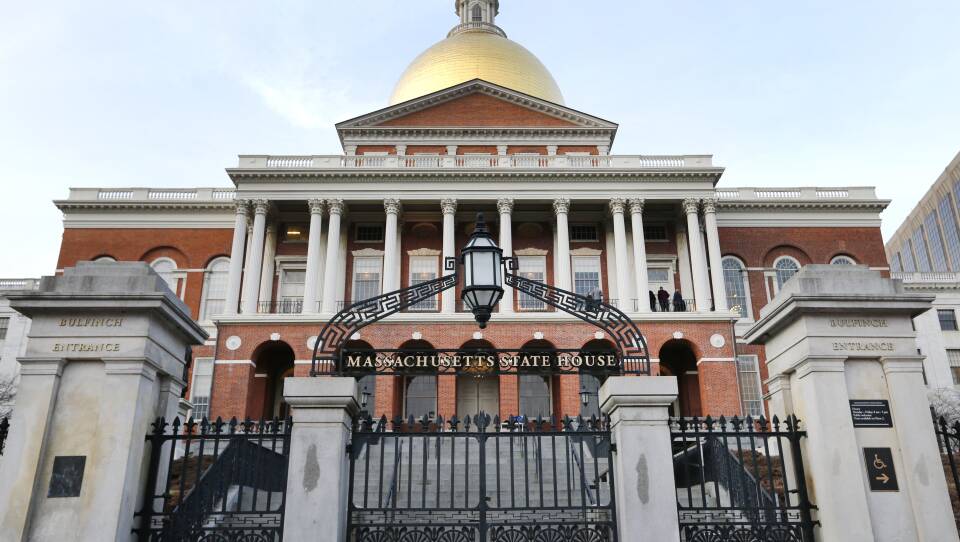Today marks one year since Governor Charlie Baker declared a state of emergency in Massachusetts due to the spread of the coronavirus, and GBH News is marking the anniversary with all-day special coverage, A Year Apart: How COVID Changed Us . GBH Morning Edition host Joe Mathieu spoke with GBH News State House reporter Mike Deehan about how Beacon Hill's attention and resources have shifted since the pandemic began. The transcript below has been edited for clarity.
Joe Mathieu: Mike, your early live streams of those [coronavirus] briefings were viral. They drew thousands of views. I was there watching them. I don't know if it was Facebook Live or Periscope at this point. Maybe both.
Mike Deehan: Yeah, I think I was trying to do both at one point. This was the days before the governor's office was live streaming them and before the TV stations were airing them.
Mathieu: That's right, you were sort of the lifeline.
Deehan: Yeah, I heard from so many people in government at the local level [and] the state level who were finding stuff out from the governor just from those live feeds. So yeah, March [and] April were crazy days last year.
Mathieu: I remember chuckling when you got a shout-out from the governor to make sure you were broadcasting so he could start one day. The pandemic has touched every facet of state government that you cover, but there are some topics that were priorities for lawmakers and for the governor in 2019 that haven't gotten a lot of attention since then for obvious reasons.
Deehan: Yeah, there really have been. The big thing that people should be reminded of, there's something left in the shadows here, and that's the opioid epidemic we were dealing with before and now, and will continue to. Attorney General Maura Healey actually brought up opiate addiction at a budget hearing just last week on Beacon Hill. It was one of the first times I really heard anyone mention what's been happening, and here's what Healey had to say:
Attorney General Maura Healey clip: Opioid overdoses and deaths increased in our state over last year. Like things are getting worse there. I understand they've fallen off the front page a little bit, but we still have a major problem in that space.
Deehan: And she's absolutely right. We do still have a major problem, and some of those numbers for opiate overdose deaths have gotten worse when it comes to Massachusetts.
Mathieu: To think we were reading those numbers every day for a while, Mike, kind of like we do COVID cases now. And to see us turn away from this, can you put numbers on it? Do we know how bad it's gotten in Mass.?
Deehan: Well, the state hasn't released data for all of 2020 yet, but throughout 2020, we can tell that it was at least as deadly when it comes to opiate overdoses as it was in 2019. The state estimated there were about 2,035 opiate OD deaths in 2019 — or about 170 a month — and for the first nine months of 2020, which is the data that's available, there were over 1,500 estimated deaths. That's also equal to about 170 per month. Actually, one sign that public health officials in Massachusetts are understandably overburdened dealing with both the coronavirus pandemic and opiates right now, is that DPH has stopped putting out opiate overdose statistics as regularly as they used to. They moved it really [to] just twice a year, whereas before, like you said, we used to have those numbers far more frequently.
Mathieu: There's been a call for money for vaccine programs [and] for a lot of things since state revenues have fallen. So many of these programs have been interrupted. Have the state's opiate programs been funded?
Deehan: Yeah, there's a lot of things that were in that pandemic budget last year that was passed. There have been some cuts, especially when it comes to public health because we know where the money has been going — it's been concentrated on the pandemic — so combating opiate addiction funding actually fell almost 5.5 percent last year. And Baker's proposed another 1.5 percent cut this year that lawmakers are now considering. Funding for secure treatment facilities for opiate addiction, which is a big part of the infrastructure for recovery, fell by a full one-third in last year's budget when the pandemic struck. Baker is proposing yet another 1.5 percent cut to that. So we're seeing where the public health money is being concentrated, and it's towards coronavirus and COVID-19 rather than opiates.
WATCH: Among other issues sidelined by COVID, where does the gas tax stand?








